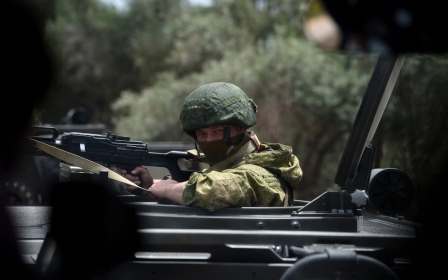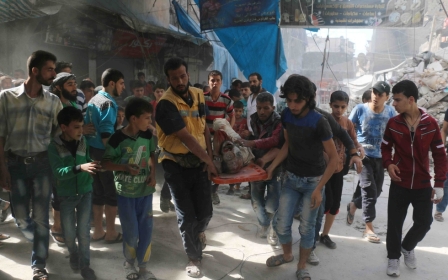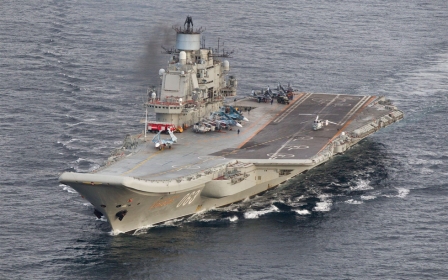UN plans evacuations from Syria's Aleppo if truce holds
The United Nations hopes to carry out the first medical evacuations from Aleppo on Friday, if the "humanitarian pause" in the Syrian army's Russian-backed assault on the city holds.
Russia announced the ceasefire earlier this week as a "goodwill gesture," amid growing international pressure over its support for Syrian President Bashar al-Assad's campaign to recapture the city.
Despite a drop in violence after the truce took effect on Thursday, there was little sign that civilians were heeding calls to leave, and Russia accused rebels of preventing civilians from fleeing the east of the city.
Meanwhile, NATO chief Jens Stoltenberg expressed concern that a Russian aircraft carrier, on its way from the North Sea and currently off the coast of Britain, could join attacks on Aleppo.
British warships shadowed the Russian ships through the North Sea, the latest cat-and-mouse encounter in two years of Cold-War style tensions.
The unilateral ceasefire in Aleppo began at 8am local time on Thursday with the aim of allowing civilians and fighters to leave the city's opposition-controlled east.
Shortly after the pause began, gunfire and artillery exchanges erupted around one crossing point, with state news agency SANA saying "terrorist groups" had targeted the area "in an attempt to hinder the humanitarian pause".
But by afternoon, the clashes had subsided and the east was calm, though the streets were empty.
Around Aleppo on Thursday, Syrian soldiers were calling through loudspeakers for residents to "seize the chance" to evacuate.
The Russian defence ministry streamed live video from several of the exit corridors, showing waiting ambulances and buses along empty roads.
An AFP photographer in government-held west Aleppo said eight wounded people had crossed via the Bustan al-Qasr crossing in spite of the fighting.
But AFP correspondents in the east visited four crossing points and saw no movement through them.
Yasser Youssef of the Nureddine al-Zinki rebel group said opposition fighters wanted "nothing to do" with the Russian initiative.
"Who are they to decide to displace the Syrian people who rebelled against the dictator Assad?" he asked.
Russian Foreign Minister Sergei Lavrov, in a phone call with his US counterpart John Kerry on Thursday, said Syrian rebels "are violating the ceasefire and preventing the evacuation of the population".
The truce was initially described as lasting just 11 hours, but Russia's Defence Minister Sergei Shoigu announced later on Thursday that it would be extended by 24 hours leaving it unclear exactly when the truce was now scheduled to end.
Shoigu also announced that the Admiral Kuznetsov carrier, part of its Northern Fleet, would be sent to the eastern Mediterranean to boost Russian naval forces in the area.
Reacting to the deployment, Stoltenberg said: "We are concerned Russia's carrier group will support military operations in Syria in ways which increase human and civilian suffering."
The nearly month-long Russian and Syrian bombing campaign in Aleppo has had "horrific" results with nearly 500 dead and food rations expected to run out by the end of the month, UN Secretary-General Ban Ki-moon said on Thursday.
Corridors
The Syrian army said it was opening eight corridors for civilians to leave Aleppo, two of which can also be used by rebel fighters provided they leave behind their weapons.
Some civilians said they were eager to leave but wanted more reassurance they would be safe.
"I don't want to risk my life or my family's by being among the first to leave," said Mohammed Shayah, a father of four.
Amnesty International meanwhile denounced the truce as "woefully inadequate".
Secretary of State Kerry said US and Saudi officials were in discussions with allies - including France, Britain, Turkey and Qatar - trying to develop a plan for a renewed ceasefire before talking to Russia.
"We're working off low and careful expectations but high hopes that the agony of Aleppo can be addressed," he said.
The UN's humanitarian task force chief Jan Egeland said on Thursday that Russia, the Syrian government and rebels had given permission for medical evacuations from Aleppo to start on Friday, adding that the UN hopes to also deliver food to the besieged east.
UN chief Ban pushed on Thursday for the 193-member General Assembly to hold a rare emergency special session on Syria since a deadlocked Security Council has failed to take action to end the nearly six-year war.
UN chief calls for General Assembly meeting
Under a 1950 resolution, an emergency special session can be called for the General Assembly to consider a matter "with a view to making appropriate recommendations to members for collective measures" if the Security Council fails to act.
"I call on all of you to cooperate and fulfil your collective responsibility to protect," Ban said. "I regret that the Security Council has failed to discharge its responsibilities to uphold peace and security for Syria."
Russia has vetoed five Security Council resolutions on Syria since 2011. China joined Moscow in vetoing the first four resolutions.
Ban and UN Syria envoy Staffan de Mistura informally briefed the General Assembly on Thursday at the request of Canada and more than a third of UN states. In its request letter, Canada said one aim of the meeting was to see if there was enough support for an emergency special session.
Such a session can be called by an assembly majority or nine members of the 15-member Security Council. Only 10 such sessions have been convened, and the last time the General Assembly met in such a session was in 2009 on Israeli actions in occupied Palestinian territories.
Middle East Eye propose une couverture et une analyse indépendantes et incomparables du Moyen-Orient, de l’Afrique du Nord et d’autres régions du monde. Pour en savoir plus sur la reprise de ce contenu et les frais qui s’appliquent, veuillez remplir ce formulaire [en anglais]. Pour en savoir plus sur MEE, cliquez ici [en anglais].




